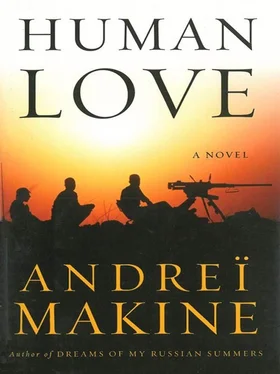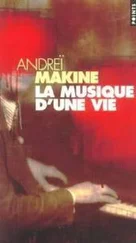That night the soldiers celebrated their victory. To begin with they listened to Ernesto, but very soon the mood changed. Catcalls rang out, someone fired in the air, bottles of drink circulated. In an hours time half the huts were on fire and the ruddy glow of the flames picked out in the darkness now a drinkers tilted head, now a brawl, sometimes the excited stampeding of half-naked men around a woman who was being raped.
Ernesto, Jacqueline, and Eliass father had taken refuge in the villages “command post,” all trying to hide their fear in their own way Ernesto was writing notes; his father was studying a large-scale map; Jacqueline was pretending to read. But each of them, Elias could see, had a gun within reach; they all knew that from one minute to the next the savagery that was being unleashed outside could engulf them. At one moment a shill cry, a woman’s voice, cut through the uproar. The besieged occupants of the “command post” looked up. Eliass eyes met his fathers. “Ill go,” said his father. But Jacqueline leaped up and clung to him, exclaiming, “No. You’re not going out! They’re coming for us. They’re going to kill us all. They’ll cut our throats. They’re savages!” Ernesto sat there, holding his head in his hands, his face distraught.
During the night the fire died down, and as if in response to the calming of the flames, the noise of the orgy gradually fell quiet. Elias opened the door. In the sky, star-studded beauty. From the earth, an acrid stench, a mixture of blood, vomit, charred meat, sweat, sperm…
He could not sleep, thinking about the error Ernesto had committed. The Cuban had promised these men a prudent, logical, patiently constructed happiness – the dream of an ideal society, communism. But they, for their part, knew a much more immediate and violent ecstasy: this night, after a battle, the exaltation of drink and drugs, the absolute freedom they had to satisfy any desire whatsoever, to thrust open any door whatever, to kill whomever they pleased, to choose the woman who attracted them, to take her without having to beg for her favors, to slay her with the advent of postcoital disgust. To drink, to rest, to start again. Absolute freedom, yes, superhuman powers. For the duration of a night they could feel themselves to be the equals of the gods. And there was this poor Cuban lecturing them about respect for revolutionary order and the need to become industrious socialists…
Deep down inside himself Elias sensed the presence of someone (someone ignoble!) who was ready to prove the soldiers right. Not that he would have wished to approve of their type of happiness. But here in the depths of a jungle where these young men had daily brushes with death, this banquet of flesh and violence had a somber justification. A simple submachine gun made all-powerful beings of these peasants, offering in a few nights of orgy all that an ordinary man can scarcely hope for from a whole lifetime.
It was terrifying to tell himself that these soldiers might be right. And to feel he was one of them.
Elias walked a little way through the throng of bodies numbed with drunkenness and drugs, and suddenly remembered that it was his birthday. He was sixteen. He had the impression of a long vista opening up before him, a vortex of encounters, faces, new things to explore, to taste, to conquer. All the infinite richness of human life…
A shadow stirred in the darkness; he stepped back, peered intently. A drunken woman, almost naked, was extricating herself from the embrace of a sleeping man. She was seated now, her eyes glinting in the moonlight, her body rendered blue by its phosphorescence. Her mouth was gasping for air; her broad thighs formed a dark, hollow triangle… Elias told himself it would be so easy to copy the soldiers, to crouch down, to thrust the woman onto her back, to plunge into that dark triangle.
The infinite richness of life… As he moved away, he reflected that this one night alone concentrated within it all that man desires, fears, hopes for, detests. There was the victors’ jubilation, and the despair of the vanquished. Ernesto’s vibrant homily, and the soldiers’ abusive mockery. Dead flesh, and bodies stirred with pleasure. The abundance of food, and the famine that from tomorrow would torment the survivors of this ravaged village. There was the almost godlike freedom the soldiers took upon themselves in killing, raping, and torturing, and the subjection of those who, reduced to a mass of pain, were the victims of this freedom. There was the sky above and, doubtless, a god to whom so many suppliant voices were raised, but who remained silent, did not intervene, allowed a child to turn itself into a ball of flesh, wedged between the legs of a little table.
The whole world was condensed into that night. And yet something was missing. The essential thing was missing. Elias felt this lack like a gentle pressure on his eyelids: those evenings long ago, the threshold of their house in Dondo and his mother still, silent, as he hid his face in the crook of her arm. Life throbbed softly beneath the smooth curve of that arm… The essential thing was this love, and that was what was missing from this world. Each of the women who had just been raped and killed had carried this universe of tenderness and peace in the crook of her arm. Each of the men killing or being killed had been that child pressing his face against his mothers arm. All that was needed was to say this, to get other people to understand this.
It was thanks to this train of thought, he later realized, that he did not go out of his mind during that murderous night.
***
The following morning the fighter in his new khaki uniform who had demanded payment of his wages from Ernesto a week earlier reported to the “command post.” “I’ve had several of the arsonists shot, Commandante,” he announced. “Now’s the time to talk to the troops. Raise their political consciousness… Sober them up, while you’re at it.” He said it with the same mocking disdain, the assurance of one who knows himself to be master of the situation. I’ve witnessed the birth of a warlord, Elias would one day reflect, when that race of killers was taking possession of the continent.
Ernesto left Africa a week after that night of fire. Elias saw him vigorously cramming a bundle of notebooks tied with string into his pack. The reason for his departure was just and noble, like everything the Cuban proclaimed in his speeches: he was going to carry the torch of the revolutionary struggle elsewhere, to seek the support of liberation movements in fraternal nations. He said this in grave, inspired tones, and as they heard him they savored the slightly faded piquancy of that verbal drug so intoxicating to men’s souls.
Jacqueline followed him almost immediately, but hers was a noisy, resentful flight. In the flood of reproaches she poured forth right up to the last minute, what stayed in Eliass mind was this regret that, for him, best defined the true nature of white people: “It could have been a fascinating experiment!” Jacqueline exclaimed. “I could have launched a veritable cultural revolution, starting with film, the art form most accessible to the people…” The whole of the West was there, thought Elias. The arrogant desire to transform other peoples lives Into an “experiment,” into a testing ground for their own Ideas. And then if this human material resists, to abandon it, to move on in search of a more malleable one.
Most of all, he grasped the very great difference between two types of revolutionary: those who could pack their bags, depart, settle somewhere else, and those who did not have this choice. Elias’s father remained.
FROM THEN ON THEIR STRUGGLE WAS HARSHER, more primitive, and also more authentic – the day-to-day battle for survival of a handful of men. Elias noted that the resistance of the defeated expressed the essence of war better than grand strategies and glorious victories. The fury of their fighting no longer had any goal beyond that moment at nightfall, after the final shots, when they found themselves still alive, another day of reprieve, when the glances they exchanged were silently eloquent of their poignant closeness as human beings.
Читать дальше









